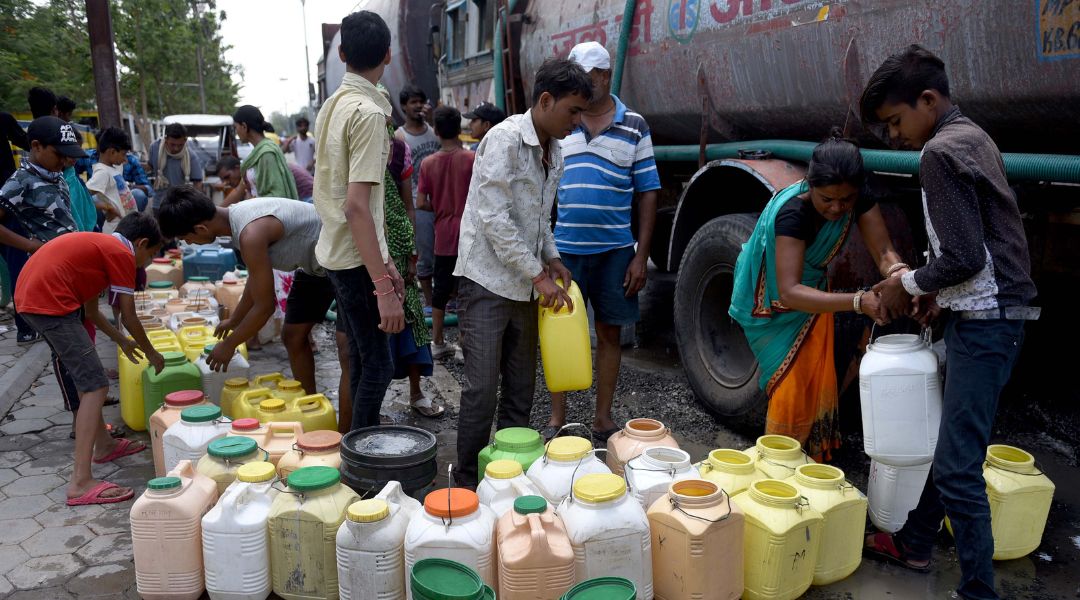
Bengaluru, the Silicon Valley of India, is currently facing one of its most challenging adversaries – the water crisis. With dwindling water resources and insufficient supply, residents are grappling with the daily struggle of securing even the most basic necessity of life – water.
Current Scenario in Bangalore
The water crisis in Bengaluru has escalated to a critical level, with residents resorting to extreme measures to cope. The city, once known for its pleasant climate and lush greenery, is now characterized by parched landscapes and depleted water reserves. Suburban areas like Babusapalya are heavily reliant on water tankers for their daily needs, but even this vital resource has become scarce in recent months.
Residents are facing a myriad of challenges, from high tanker rates to irregular water supply. Despite government interventions like fixed rates for tankers, the problem persists due to high demand and logistical issues. The situation is dire for families, especially those with infants, who struggle to meet their basic hygiene needs.
The water crisis has permeated every aspect of daily life in Bengaluru. From limited bathing routines to the reliance on treated water for non-drinking purposes, residents are forced to adapt their lifestyles to conserve water. Hospitals, too, are feeling the strain, with facilities like Brookfield Hospital relying on water recycling to meet their needs. Bengaluru needs 2,600-2,800 million liters of water daily and the current supply is half of what’s required. The result is a daily struggle for the city’s residents.
Initiatives
While the government has taken steps to address the crisis, including fixing tanker rates and implementing fines for misuse of drinking water, criticism abounds regarding the efficacy of these measures. Meanwhile, long-term solutions like the Mahadayi project offer hope for alleviating the city’s water woes, but progress remains sluggish.
Amidst the chaos, voices of resilience emerge from the community. Residents recognize the need for collective action and call for sustainable solutions that extend beyond government intervention. Initiatives like water conservation efforts and online water supply platforms showcase the community’s determination to combat the crisis together.
The water crisis in Bengaluru is not merely a temporary inconvenience but a wake-up call for comprehensive action. As residents endure hardships and authorities grapple with solutions, the need for concerted efforts towards sustainable water management becomes increasingly urgent.
Simple Solution?
Akvo Atmospheric Water Generators (AWGs) have the potential to positively impact the water crisis in Bangalore in several ways:
Localized Water Production: Akvo AWGs can produce water directly from the atmosphere, providing a localized and reliable source of clean drinking water. This reduces dependency on external water sources such as rivers and groundwater, which are currently overstressed and depleting rapidly in Bangalore.
Diverse Applications: These AWGs can be deployed in various settings, including residential areas, commercial complexes, and hospitals. By providing access to clean water at the point of use, Akvo AWGs can alleviate the burden on existing water infrastructure and reduce the need for costly water transportation via tankers.
Energy Efficiency: Akvo AWGs utilize advanced technologies to extract water from the atmosphere with minimal energy consumption. Compared to traditional water purification methods, such as reverse osmosis or distillation, AWGs require lower energy inputs, making them cost-effective and environmentally sustainable in the long run.
Community Empowerment: By decentralizing water production, Akvo AWGs empower communities to take control of their water supply. This reduces reliance on centralized water distribution systems, which are often prone to inefficiencies. Communities can tailor the use of Akvo AWGs to their specific needs, ensuring equitable access to clean water for all residents.
In summary, Akvo Atmospheric Water Generators offer a promising solution to the water crisis in Bangalore by providing localized, clean water production that is resilient to climate fluctuations and energy-efficient. By integrating AWGs into existing water management strategies, Bangalore can mitigate the impacts of water scarcity and ensure a more sustainable future for its residents.
Link to article: https://www.ndtv.com/bangalore-news/bengaluru-water-crisis-bengaluru-residents-hospitals-cry-for-help-as-water-reserves-dwindle-5229006
